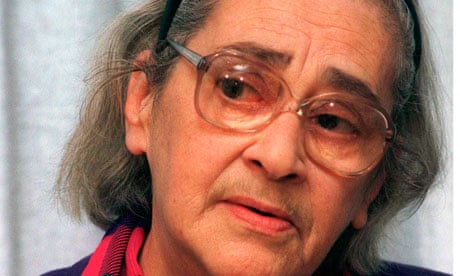Yelena Bonner, the Russian rights activist and widow of the Nobel peace prize winner Andrei Sakharov, has died aged 88.
Bonner died of heart failure on Saturday afternoon in Boston, according to her daughter, Tatiana Yankelevich. She had been in hospital since February, Yankelevich said.
Bonner grew famous through her marriage to Sakharov, the Soviet Union's leading dissident, but she carved out her own reputation as a tireless human rights campaigner in the face of relentless hostility from Soviet authorities.
Bonner and Sakharov's cramped three-room apartment in Moscow was the unofficial headquarters of the Soviet dissident movement in the 1970s, and again in the late 1980s after they returned from internal exile in the city of Gorky.
Both suffered constant harassment, and Soviet officialdom regularly made caustic, personal attacks against Bonner, accusing her of being a foreign agent who had bullied her husband, the father of the Soviet atomic bomb, into turning against his country.
The attacks only seemed to strengthen their resolve, and neither stopped calling for greater personal freedom for Soviet citizens.
"I hope to live out my life until the end worthy of the Russian culture in which I've spent my life, of the Jewish and Armenian nationalities, and I am proud that mine has been the difficult lot and happy fate to be the wife and friend of academic Andrei Dmitrievich Sakharov," Bonner wrote in her autobiography.
After Sakharov died in 1989, and the Soviet Union collapsed two years later, Bonner continued to champion human rights but was less and less visible. Her health began to deteriorate – she had a long history of heart and eye problems and suffered heart attacks in 1995 and 1996.
Nonetheless, she edited her husband's memoirs, which were released in 1997, and still occasionally spoke out against Boris Yeltsin's government, denouncing Russia's bungled war in Chechnya and the shortcomings of the country's young democracy.
In recent years, Bonner lent her voice to those opposing the rule of Vladimir Putin, who has restored many of the Soviet-era powers of the security services. In March last year, hers was the first signature on a petition calling for Putin to go.
In December, she sent a moving speech that was read at an opposition rally in Moscow in which she asked to be considered among those in the square: "Consider that I have come, again, to save my homeland, although I cannot walk."
Bonner and Sakharov met through their political activities, and were married in 1971, both for the second time. He won the Nobel prize in 1975.
For nearly two decades they were the first couple of the dissident movement, confronting the Soviet state regardless of the consequences. After Sakharov criticised the Soviet invasion of Afghanistan, he was banished in 1980 to Gorky, now known as Nizhny Novgorod. Bonner was found guilty of slander against the state in 1984 and also sentenced to internal exile in Gorky. The couple shared an apartment across the street from the police station, and they were under constant scrutiny.
She detailed their plight, often with wit and irony, in a 1986 book, Alone Together. "Whenever the authorities did not like something, it was our car that suffered. Either two tyres would be punctured, or a window smashed or smeared with glue. This was how we knew that we had done something bad by their standards," she wrote.
Under Mikhail Gorbachev's reforms, the couple were allowed to return to Moscow in 1986 and together they pressed ahead with their campaign until Sakharov's death.
